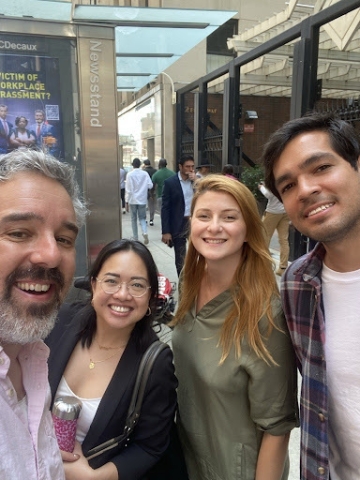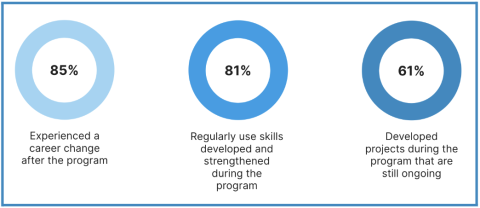
Sebastián Rodríguez of Costa Rica has covered climate change for years. But his ICFJ fellowship in New York at The Verge, an outlet that reports on technology, was a step out of his comfort zone – an important one.
“It helped me experience new approaches to journalism that can only come through a space like this one, where I can pause from my daily work and re-think it completely,” said Rodríguez, a special projects editor at Climate Home News whose stories for The Verge included this investigation on global supply chains.
Rodríguez is part of a unique network of journalists from across the Americas, brought together through ICFJ’s Emerging Media Leaders fellowship, a Professional Fellows Program funded by the U.S. State Department’s Bureau of Educational and Cultural Affairs. Over nine years, our initiative has embedded 247 journalists and media entrepreneurs from Latin America and the Caribbean in U.S. newsrooms, and sent dozens of U.S. newsroom partners to Latin America. The exchange enormously benefits U.S. news outlets, enriches reporting for U.S. audiences, and strengthens public interest media across the Americas.
“To be able to have that exchange across borders, it just increases the amount of creativity that you can bring to this process,” said Bettina Chang, co-founder of City Bureau. Her newsroom hosted Gilberto Vieira da Cruz Junior, whose reporting in the poorest parts of Rio de Janeiro, Brazil, is very similar to City Bureau’s in Chicago, she said.
Documented, a New York City newsroom that covers immigration, was able to co-publish with outlets in seven countries thanks to the networks of the fellows they hosted, said Rommel Ojeda, community correspondent. They continue to collaborate. “Having the opportunity to work with them even past the program itself really shows the value that they bring to the newsroom,” Ojeda said.
Better Journalism Across the Americas
The impact on U.S. newsrooms is just one side of the story. The fellows from Latin America deepen their skills, connections and knowledge, using the experience as a springboard to do better journalism at home, sometimes in countries where it is extremely challenging for them to operate. Many have advanced their careers, grown their news outlets and launched new digital projects – helping to shape the future of journalism.

Some recent examples:
- Carolina Pichardo Hernández is now freelancing for The Washington Post in the Dominican Republic after her fellowship at USA Today. As a fellow, she covered how smugglers are using TikTok to advertise their “services” to migrants seeking to cross the southern U.S. border.
- Mario Cerna in 2021 launched Honduras Verifica, a fact-checking outlet and “disinformation observatory.” Through the fellowship, Cerna said he learned best practices in management, project design and more that have helped him attract partners and funders.
- The fellowship brought together Fernanda Aguirre of Mexico and Rosario Marina, who collaborated on a project to enhance reporting on the Argentine judiciary. Aguirre built an AI tool for Marina’s newsroom that makes it easier for journalists to extract information from PDFs.
I want to thank our newsroom hosts, as well as our fellows. Coming together across borders is immensely valuable. It leads to break-through innovation and better reporting. And that serves us all.